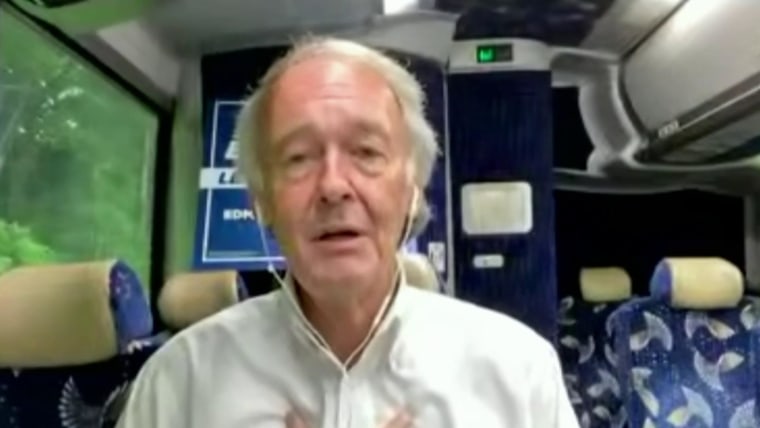The long-awaited Massachusetts Democratic Senate primary between a progressive incumbent and arguably the last scion of the Kennedy political dynasty is set for Tuesday.
The race between Sen. Ed Markey and Rep. Joe Kennedy III, the grandson of the late Sen. Robert Kennedy and the grandnephew of former President John F. Kennedy, has been framed more as a generational rift.
The two men have few major policy disagreements. Instead, Kennedy, 39, has framed himself as a youthful, energetic alternative to Markey, 74. Markey and his backers, on the other hand, tout his long record of advocacy and paint Kennedy as “a progressive in name only,” accusing the Kennedy campaign of wasting resources on a safely blue seat as Democrats try to capture a Senate majority this fall.
The race has grown bitter in recent weeks. Last week, the Kennedy campaign complained that Markey supporters on Twitter were harassing Kennedy and urged Markey to do something about it, while ads on both sides have grown increasingly negative.
When it comes to endorsements, both candidates have reeled in big ones.
Markey, who served in the House for more than 35 years before he was elected to the Senate in 2013, appears to have the edge. He has support from Senate Minority Leader Chuck Schumer, D-N.Y., and the Democratic Senatorial Campaign Committee. He has also won the backing of his Senate colleague from Massachusetts, Elizabeth Warren; Rep. Alexandria Ocasio-Cortez, D-N.Y., with whom Markey co-sponsored the Green New Deal legislation; and major environmental groups.
Kennedy, on the other hand, has been endorsed by House Speaker Nancy Pelosi, D-Calif., House Majority Leader Steny Hoyer, D-Md., and several other well-known Democrats. Kennedy was also endorsed by Rep. John Lewis, D-Ga., who died last month. In addition, Kennedy got the backing of several key labor unions.
Kennedy was first elected to the House in 2012, and his influence in the chamber has captured plenty of attention from Democratic leaders; in 2018, the party tapped him to deliver the Democratic response to President Donald Trump’s State of the Union address.
While several statewide polls this spring showed Kennedy with a narrow but persistent lead, the latest surveys show Markey’s having opened up a comfortable lead.
A Suffolk University poll of likely Massachusetts Democratic voters released Wednesday showed Markey with a 51 percent to 41 percent lead, while a University of Massachusetts-Lowell poll of likely Democratic voters in the state released two days earlier showed him with a 12 percentage-point (52 percent to 40 percent) advantage.
When it comes to fundraising, the campaigns have also been just about even. Second-quarter fundraising numbers show the two campaigns in a virtual tie: After each campaign raised about $1.9 million in the quarter, Markey’s campaign reported $4.8 million in its account, while Kennedy’s campaign said it had about $4.7 million.
Kennedy, however, vastly outspent Markey on advertising from April through June and blitzed Massachusetts airwaves, spending about $2.8 million on ads to date, compared to less than $700,000 spent by Markey’s campaign and a super PAC backing him.
Download the NBC News app for breaking news and politics
The online campaign intensified over the summer. Incensed by Kennedy’s primary challenge against an environmentalist incumbent, a number of Markey’s Twitter supporters successfully pressured several Broadway stars to back out of a Kennedy fundraiser they had been scheduled to headline. The event has been postponed indefinitely by the Kennedy campaign.
Kennedy’s ads have largely focused on showcasing the frustration of the younger generations who have been pushing for change, while Markey in recent weeks has run ads stressing that the state already has “a senator who is getting the job done.”
Whoever wins the primary is widely expected to win the general election in November.













